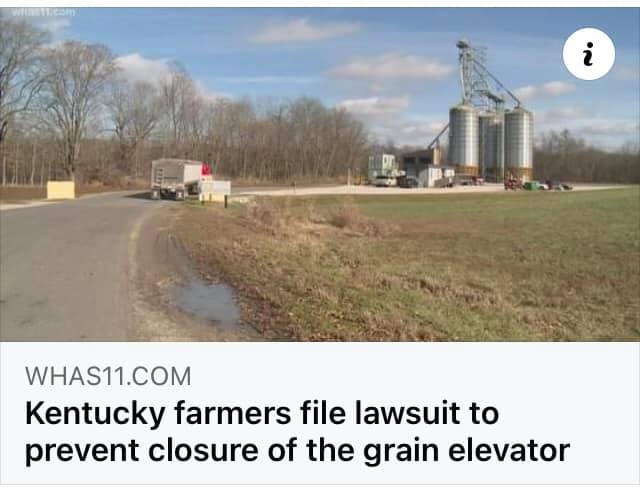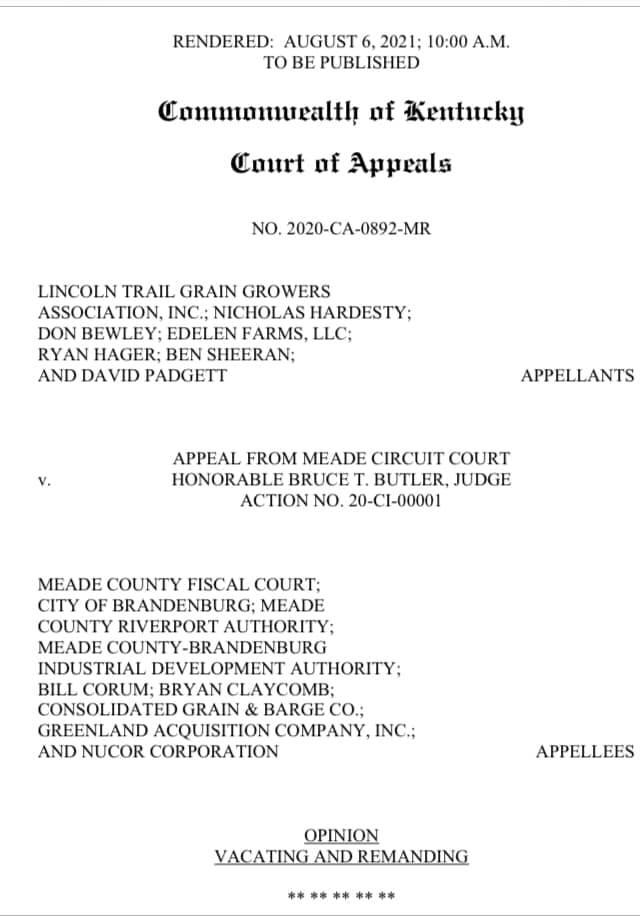

An unusual published opinion from the Kentucky Court of Appeals today on a perennial problem in open meetings cases.
(Here is a January 2020 post on the lawsuit at the time of its original filing: https://www.facebook.com/419650175248377/posts/595215384358521/?d=n)
Lincoln Trail Grain Growers Association, Inc. v. Meade County Fiscal Court does not address whether the fiscal court violated the open meetings law. Instead, it addresses the Association's "standing" to be heard by the court on its claim of an open meetings violations. The case also examines how violations of the open meetings law may be remedied.
http://opinions.kycourts.net/COA/2020-CA-000892.PDF
The Kentucky Court of Appeals vacated the Meade Circuit Court's dismissal of an open meetings complaint filed by Lincoln Trail Grain Growers Association, Inc., and others, against Meade County Fiscal Court, and others. The Court of Appeals remanded the case back to the trial court "for additional proceedings on the merits of those claims."
In simpler terms, the Court of Appeals rejected the trial court's dismissal of the Association's open meetings case — based an the trial court's erroneous conclusion that the Association lacked standing to bring the open meetings claims because it suffered no injury from the alleged open meetings violations.
The Court of Appeals sent the case back to the Meade Circuit Court to rule on the Association's claim that the Meade Fiscal Court violated the open meetings law at an October 1, 2019, special meeting. It appears that claim was based on deficiencies in the special meeting notice/agenda which "included the general item, 'Riverport,' with no other detail about the action to be taken" — among other other claimed violations.
The Court of Appeals did not rule on the sufficiency of the special meeting notice or any other open meetings violation the Association claimed. The Meade Circuit Court must now do so. The Association or the fiscal court may thereafter appeal the circuit court's ruling back up to the Court of Appeals.
On the issue of standing to bring the open meetings claim, the Court of Appeals held that "all citizens have a direct interest in public agencies' compliance with the requirements of the Open Meetings Act. The particularized injury arises from the agency's violation of the Act itself, not specifically from the action taken. By its express terms, the Act accords standing regardless of whether the person bringing the action has an interest in the subject matter of the action taken."
The person alleging a violation of the open meetings law need not show that s/he was directly injured by the open meetings violation, the Court of Appeals observed, reasoning that "the rights accorded under the Act . . . grant the public at large a direct interest in its enforcement. In other words, the violation of the Act itself constitutes the direct and personal injury. To hold otherwise would mean that no member of the public would have standing to challenge a violation of the Open Meetings Act without a showing of direct injury caused by the agency's unlawful action. That result is at odds with the plain language of the Act."
The Court of Appeals rejected the Meade Circuit Court's conclusion that the Association's claim "fails for lack of redressability" — a way to make the injury right — criticizing the circuit court's narrow focus "on the result of the actions of the Fiscal Court . . . rather than their alleged violations of the Open Meetings Act. As previously noted, '[a]ny rule, resolution, regulation, ordinance, or other formal action of a public agency without substantial compliance with the requirements of [the Act] shall be voidable by a court of competent jurisdiction.' KRS 61.848(5). The Act also allows a plaintiff to recover costs, including reasonable attorney fees, incurred while enforcing an agency's willful violation. KRS 61.848(6). Because the Act creates a concrete remedy, we conclude that the Association has asserted a redressable injury.
. . .
"If the Association shows that it is entitled to relief," the trial court may require the Fiscal Court to recommence the action taken "at the point when the illegal conduct occurred. We recognize that the procedural posture of this case presents some issues with the remedies available to Lincoln Trail. When an agency takes action that is not in "substantial compliance" with the Act, that action 'shall be voidable by a court.' KRS 61.848(5). 'A "voidable"action is an action that is valid until it is annulled.' Carter v. Smith, 366 S.W.3d 414, 424 (Ky. 2012) (citing BLACK'S LAW DICTIONARY 1709 (9th ed. 2009)).
"[I]t is for the trial court to determine the appropriate remedies available to the Association and the equities among the various parties. Even if no other remedies are available, the open meetings law permits the Association to recover its attorney fees and costs incurred in bringing the action. KRS 61.848(6)."
This is a broad and welcomed reading of the complainant's right to pursue an open meetings claim and — if the claimant shows s/he is entitled to relief — to have that claim redressed or made right —and how — even if only by recovering her/his attorney's fees and costs.


